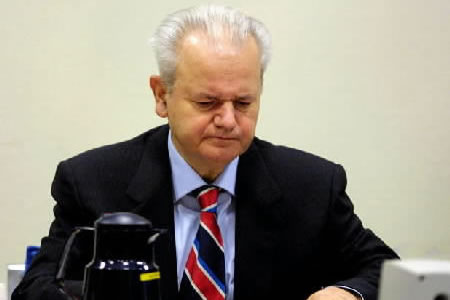Home
MILOSEVIC ASSUMES PRINCIPAL ROLE AGAIN
“If all goes well," the decision of the Appeals Chamber published today notes, the trial of Slobodan Milosevic "should continue much as it did when the accused was healthy." However, if any serious health problems arise, the presence of assigned counsel will make it possible for the trial to continue even if the accused is rendered temporarily unable to participate.
 Slobodan Milosevic in the courtroom
Slobodan Milosevic in the courtroom The Appeals Chamber today affirmed the Trial Chamber’s decision assigning counsel to Slobodan Milosevic, reaffirming at the same time the right of the accused to represent himself before the Tribunal. The task of balancing the two conclusions, which seem irreconcilable at first sight, has been referred to the Trial Chamber. It now has to define new "modalities" for the conduct of the trial.
The Appeals Chamber decision provides guidelines for the Trial Chamber to follow when defining the "modalities," i.e., the new working regime in court. The regime should "minimize the practical impact of the formal assignment of counsel" to the extent required by the interests of justice. This means that Milosevic will, when physically capable, take the lead in presenting his case, choose which witnesses he will question before assigned counsel, argue his motions before the court, and present his closing argument when the defense rests.
The Appeals Chamber notes that “in practice, if all goes well, the trial should continue much as it did when Milosevic was healthy," with the accused again “playing the principal courtroom role"; lay persons will find it hard to notice any change in the way the trial was conducted before the accused was assigned counsel.
However, if Milosevic's health deteriorates as the trial continues, the presence of assigned counsel would, in the opinion of the Appeals Chamber, make it possible for the trial to continue even if the accused is rendered temporarily unable to participate. It will be up to the Trial Chamber to decide when the roles in the courtroom should be reshuffled.
Although the right of the accused to represent himself is "indisputable," the Statement of Reasons in the Appeals Chamber decision notes that jurisprudence all over the world recognizes that the right to self-representation is not "categorically inviolable" or absolute. The right of an accused to defend himself is subject to certain limitations, but those limitations should not be greater than what is "necessary to achieve the goals" which prompted their introduction.
In the Appeals Chamber’s opinion, the error in the Milosevic case was not that counsel was assigned to him for health reasons, but the imposition of greater limitations than were strictly necessary for the presentation of his defense. While it affirmed the first-instance decision to assign counsel, the Appeals Chamber remanded the so-called Order on Modalities – the working regime in the courtroom – to the Trial Chamber, which is to modify and harmonize it with the above-mentioned guidelines.
In addition to the Order on Modalities, the Trial Chamber also has before it the request filed by assigned counsel, Steven Kay and Gillian Higgins, which was referred there by the Registry. The British lawyers no longer want to play the role entrusted to them – the role that has been substantially changed by the Appeals Chamber decision made public today.
It remains to be seen whether Milosevic will be satisfied with the restoration of his "principal role" in the courtroom with the continued presence of assigned counsel--who may step in and replace him if he falls ill--or whether he will persevere in the "all or nothing" game.
Linked Reports
- Case : Milosevic Slobodan - "Kosovo, Croatia and Bosnia"
- 2004-10-29 THE MILOSEVIC CASE: APPEALS CHAMBER TO RENDER DECISION MONDAY
- 2004-10-27 THE REGISTRY LETS JUDGES DECIDE ON DEFENSE REQUEST
- 2004-10-21 WHO RUNS THE TRIBUNAL: THE ACCUSED OR THE JUDGES?
- 2004-11-03 PREPARATIONS UNDERWAY FOR THE CONTINUATION OF THE MILOSEVIC TRIAL
- 2004-11-09 KAY: DECISION ON THE ASSIGNMENT OF COUNSEL “UNIMPLEMENTABLE IN PRACTICE”
- 2004-11-10 CAN A “STUBBORN ACCUSED” BE ASSIGNED COUNSEL?
